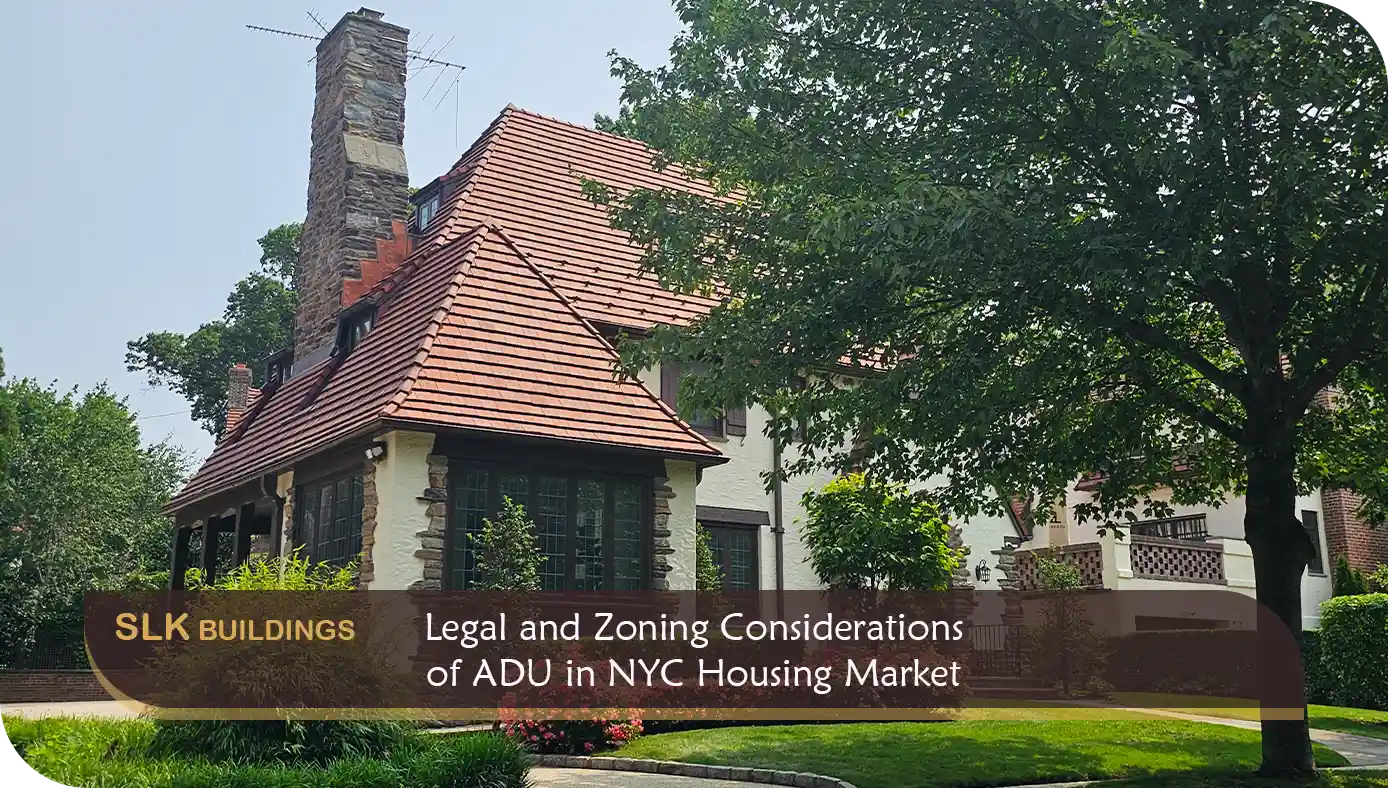Legal and Zoning Considerations of ADU Development in NYC

Legal and Zoning Considerations of ADU Development in NYC
Developing Accessory Dwelling Units (ADUs) in New York City presents homeowners with a promising opportunity to maximize their property’s utility and potentially generate additional income. However, navigating the legal and zoning landscape is crucial to ensure compliance with city regulations and avoid costly setbacks. Here’s a detailed exploration of the key legal and zoning considerations for NYC ADU development:
ACCESSORY DWELLING UNIT
RELATED ARTICLES
- Plus One ADU
-
What is ADU Housing? A Comprehensive Guide to Accessory Dwelling Units
- Community Impact of ADU and Neighborhood Stability in NYC
-
Rental Income Opportunities: ADU Development in New York City
-
Multi-generational Living: ADU as a Solution for NYC Families
-
Design Considerations for NYC ADUs: Making the Most of Limited Space
-
New York City’s ADU Regulations: What Homeowners Need to Know
-
Unlocking New Opportunities: Exploring NYC DOB’s Accessory Dwelling Units (ADUs)
Legal and Zoning Considerations of ADU Development in NYC
Why Choose SLK Buildings?
- Proven Track Record
- Diverse Clientele
- Integrated Services
- Client-Centric Approach
- Registered Representative
Call Us 212.888.3888
Proven Track Record: Over two decades of successful dealing with NYC Department of Buildings Rules and Regulations.
Diverse Clientele: Trusted by a broad spectrum of clients, from individual property owners, architects, engineers, attorneys, hospitality business owners, project management firms to large scale developers.
Integrated Services: A one-stop solution encompassing consultation, representation, documentation and compliance support. We manages the entire process, from determining applicability to Accessory Dwelling Unit qualification, filing your ADU application, coordinating with our Registered Architect or Professional Engineer partner, to the completion.
Client-Centric Approach: Tailored strategies that prioritized our clients’ unique needs and objectives.
Registered Representative: We are registered Filing Representative with Department of Buildings and Registered Representative with OATH (Office of Administrative Trials and Hearings) and familiar with the Rules of Practice for the OATH Hearings Divisions.
Zoning Regulations
Legal and Zoning Considerations of ADU Development in NYC
- Zoning Districts: NYC’s zoning resolution divides the city into various zoning districts, each with its own regulations governing land use, building density, and allowable structures. Homeowners must determine if their property is located in a zoning district that permits ADUs.
- Use Group Classification: ADUs typically fall under the “Accessory Use” category in NYC’s zoning resolution. However, specific regulations regarding the creation of ADUs may vary depending on the property’s use group classification, such as residential, commercial, or mixed-use.
- Lot Size and Setbacks: Zoning regulations dictate minimum lot size requirements and setback distances from property lines, streets, and other structures. Homeowners must ensure that their property meets these requirements before proceeding with ADU development.
Building Codes and Regulations
- Structural Requirements: ADUs must comply with NYC’s building codes, which include provisions for structural integrity, fire safety, and seismic resilience. Homeowners should work with architects and engineers to design ADUs that meet these requirements.
- Egress and Safety: Building codes specify requirements for egress routes, emergency exits, and safety features such as smoke detectors and carbon monoxide alarms. ADU designs must incorporate these elements to ensure occupant safety.
- Utilities and Infrastructure: ADUs must have adequate access to utilities such as electricity, water, and sewer services. Homeowners may need to upgrade existing infrastructure or install new connections to accommodate the additional dwelling unit.
Permitting Process
- Department of Buildings (DOB) Permits: Homeowners must obtain the necessary permits from the NYC Department of Buildings before constructing or converting an ADU. This process typically involves submitting architectural plans, undergoing plan review, scheduling inspections, and obtaining approvals.
- Certificate of Occupancy (CO): Once construction is complete, homeowners must obtain a Certificate of Occupancy from the DOB to legally occupy the ADU. The CO certifies that the unit complies with all applicable building codes and zoning regulations.
Legalization of Existing Units
- Illegal ADUs: Some homeowners may have existing ADUs on their property that were created without proper permits or approvals. Legalizing these units requires working with the city to bring them into compliance with all relevant regulations, which may involve retrofitting, inspections, and obtaining retroactive permits.
Affordable Housing Requirements
- Inclusionary Housing Programs: NYC offers various incentive programs to encourage the creation of affordable housing, including ADUs. Homeowners participating in these programs may be subject to affordability requirements, such as renting ADUs to low- or moderate-income tenants at below-market rates.
Consultation and Professional Guidance
- Architects and Engineers: Homeowners should engage architects and engineers familiar with NYC’s building codes and zoning regulations to develop ADU designs that comply with all requirements.
- Legal Experts: Consulting with legal experts specializing in real estate law can help homeowners navigate the complexities of ADU development, including permitting, zoning variances, and compliance issues.
Developing ADUs in New York City requires a thorough understanding of the legal and zoning considerations governing land use, building codes, and permitting processes. By carefully navigating these regulations and seeking professional guidance, homeowners can successfully unlock the potential of their properties while complying with all applicable laws and regulations.
Seeking Professional Guidance
Navigating New York City’s Department of Buildings (DOB) and NYC Housing Preservation & Development regulations for Accessory Dwelling Units can be complex and time-consuming. Homeowners and property owners are strongly encouraged to consult trusted architects, engineers, or legal advisors familiar with local zoning laws, building codes, and permit requirements. Partnering with experienced professionals like **SLK Buildings** ensures you stay compliant, avoid costly delays, and complete your ADU project with confidence. From initial feasibility studies and code compliance reviews to full DOB filing and expediting services, **SLK Buildings** is here to guide you through every step of the process.